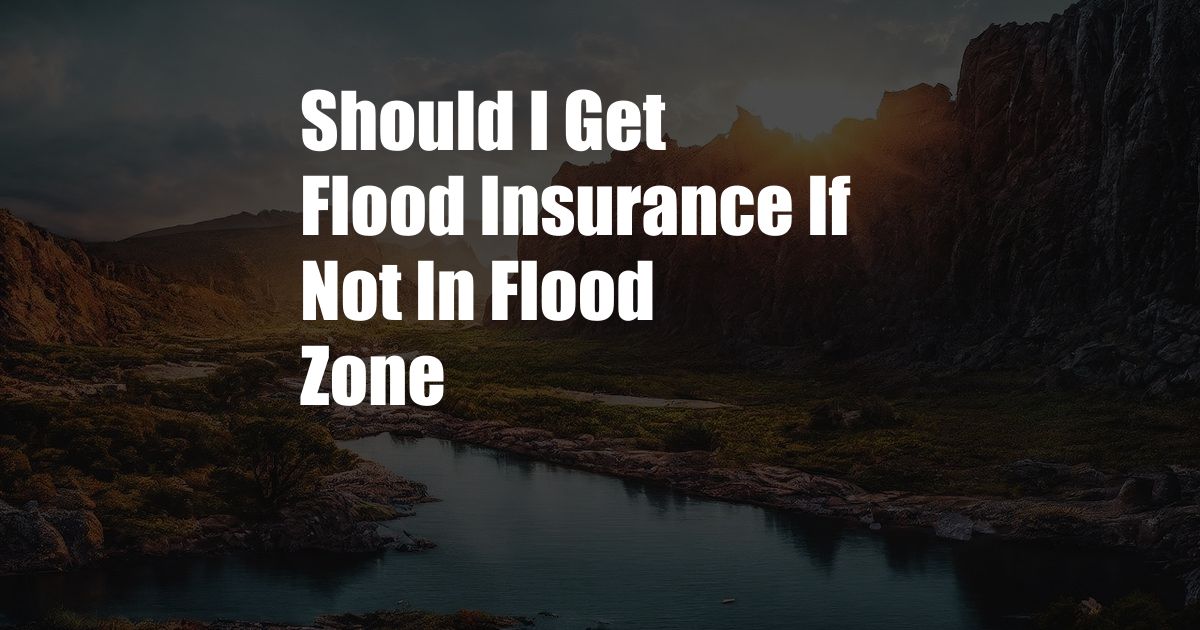
Should I Get Flood Insurance if Not in a Flood Zone?
As the recent devastating floods across various parts of the country have shown, water damage from flooding can occur even in areas not designated as high-risk flood zones. Many homeowners may wonder if it’s worthwhile to purchase flood insurance even if they don’t live in a flood-prone area.
While the risk of flooding is lower in non-flood zones, it’s far from negligible. Unexpected factors such as heavy rainfall, melting snow, dam failures, or even overflowing rivers can cause flooding, potentially resulting in significant property damage and financial losses.
Understanding Flood Insurance Coverage
Flood insurance is a specialized type of coverage that protects your property from damage caused by flooding. It’s not included in standard homeowners or renters insurance policies and must be purchased separately. Flood insurance covers not only the structure of your home but also its contents, such as furniture, appliances, and valuables.
Flood insurance policies are typically underwritten by the National Flood Insurance Program (NFIP) and regulated by the Federal Emergency Management Agency (FEMA). They offer varying levels of coverage, with building coverage ranging from $10,000 to $500,000 and contents coverage up to $100,000.
Factors to Consider
Whether or not to purchase flood insurance if you’re not in a flood zone depends on several key factors:
- Proximity to bodies of water: Even if your home is not directly on the waterfront, proximity to rivers, lakes, or creeks can increase your flood risk.
- Elevation and topography: Homes in low-lying areas or near slopes are more vulnerable to flooding, especially during heavy rainfall events.
- Soil conditions: Sandy and porous soils tend to drain quickly, reducing the likelihood of flooding. On the other hand, clay or poorly drained soils can increase the risk.
- Historical flood data: Research the flood history of your area. Even if there have been no recent floods, past occurrences suggest a potential for future flooding.
- Future development plans: If your area is experiencing rapid development, new construction projects may alter drainage patterns, potentially increasing flood risks.
Tips and Expert Advice
If you’re considering purchasing flood insurance, here are some tips from experts:
- Assess your risk: Carefully evaluate the factors mentioned above to determine your flood risk level.
- Obtain a flood insurance quote: Contact insurance companies to get quotes for flood insurance. Consider different coverage options and deductibles to find a plan that meets your needs and budget.
- Compare policies: Don’t just go with the first quote you receive. Compare policies from multiple insurance providers to ensure you’re getting the best value and coverage.
- Understand the deductible: The deductible is the amount you pay out of pocket before your insurance coverage kicks in. Higher deductibles typically result in lower premiums.
- Review your policy regularly: Flood insurance policies should be reviewed annually to ensure they still meet your coverage needs. Contact your insurance agent if you make any significant changes to your home or property.
Frequently Asked Questions
Q: Does my homeowners insurance policy cover flood damage?
A: No, flood insurance is a separate policy that must be purchased in addition to homeowners insurance.
Q: How much flood insurance coverage do I need?
A: The amount of coverage you need depends on the value of your property and belongings. Consider the potential financial loss you could face in the event of a flood.
Q: I’m not in a flood zone, so why would I need flood insurance?
A: Even non-flood zones are at risk of flooding due to factors such as heavy rainfall, dam failures, or overflowing rivers.
Q: Can I purchase flood insurance after a flood occurs?
A: Yes, but flood insurance policies typically have a waiting period of 30 days before coverage begins.
Conclusion
The decision of whether or not to purchase flood insurance if you’re not in a flood zone is a personal one. By carefully considering the factors outlined in this article and seeking expert advice, you can make an informed decision that protects your home and financial well-being from the unexpected threat of flooding.
Are you concerned about the potential for flooding in your area? Share your thoughts and experiences in the comments below.